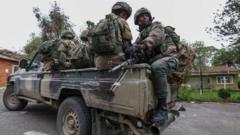The ongoing cease-fires in Lebanon and Gaza are increasingly vulnerable as violence escalates, with reports of casualties and military operations casting doubt on the truce's longevity.
Cease-Fires in the Middle East Show Signs of Fracture Amid Violence

Cease-Fires in the Middle East Show Signs of Fracture Amid Violence
Fragile cease-fires in Lebanon and Gaza are threatened by renewed hostilities and rising casualties.
As tensions continue to boil over in the Middle East, cease-fires in Lebanon and Gaza are teetering on the edge of collapse. On Sunday, Israeli forces reportedly killed at least 22 individuals and left many more injured in southern Lebanon, dealing a significant blow to hopes for lasting peace. The violence coincides with Israel’s claims that Hamas has breached the terms of the truce, further complicating the situation.
Displaced residents of Gaza and Lebanon had been hopeful of returning home, yet the prospect now seems increasingly grim. Thousands of Lebanese citizens had begun returning south after the November cease-fire, but the situation has rapidly deteriorated. According to the Lebanese Health Ministry, Sunday became the deadliest day since the cessation of hostilities, with Israeli military actions causing numerous fatalities.
Israel's military defense claimed the actions were necessary to “eliminate threats,” indicating that any retaliatory measures were deemed justified due to perceived provocations, including groups allegedly using Hezbollah flags. This has raised serious concerns about the ongoing presence and activities of Hezbollah in southern Lebanon, which Israeli officials believe could further destabilize the region.
The escalating strife suggests that the road to lasting peace remains fraught with peril as families await the possibility of security and stability in their war-torn homes.
Displaced residents of Gaza and Lebanon had been hopeful of returning home, yet the prospect now seems increasingly grim. Thousands of Lebanese citizens had begun returning south after the November cease-fire, but the situation has rapidly deteriorated. According to the Lebanese Health Ministry, Sunday became the deadliest day since the cessation of hostilities, with Israeli military actions causing numerous fatalities.
Israel's military defense claimed the actions were necessary to “eliminate threats,” indicating that any retaliatory measures were deemed justified due to perceived provocations, including groups allegedly using Hezbollah flags. This has raised serious concerns about the ongoing presence and activities of Hezbollah in southern Lebanon, which Israeli officials believe could further destabilize the region.
The escalating strife suggests that the road to lasting peace remains fraught with peril as families await the possibility of security and stability in their war-torn homes.






















